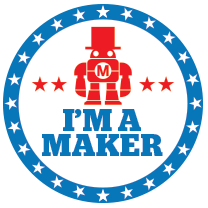As I wrap up my last course for my Graduate Certificate in Educational Technology from Michigan State University, I was asked to examine my own passions and curiosities. These two ingredients, also know as PQ and CQ (Friedman, 2013), are so critical to innovating in education and sustaining meaningful engagement in teaching and learning.
I spent some time reflecting on exactly where my passions lie and what things I am currently (and constantly) curious about in my life. I realized that many of them (e.g., global collaboration and travel, design thinking, coaching, scaling innovation) are topics that drive my use of technology. I participate in a variety of affinity groups (Gee, 2013), such as the Teachers Guild, the #dtk12chat and #makered communities, ISTE Early Learning Network, and most recently the Google for Education Certified Innovator group (shoutout to the #MTV16 cohort!). My engagement with these groups is driven by my passions and curiosities and I also use technology to enact another passion of mine, being a creator (vs. a consumer) and sharing my creations with my different affinity groups. Most of those creations are digital, so on a regular basis I share blog posts, videos, tweets, presentations and resource docs with others in my community, both locally and globally.
I think my participation in these digital groups and my shared, online creations help me express my passion and curiosity and in turn, I can take what I discover in these groups and bring it to my students. I work to scaffold their use of technology to help them create products that also express their passions and engage their curiosity. For example, I try to provide options and involve students in open-ended brainstorming, so if they decide they want to use 3D printing, a green screen, or recycled materials to express their ideas and curiosities, they can! In addition to using methods like design thinking and hands-on tinkering, I strive to support mindsets that will encourage my students to discover their passions and embrace curiosity, such as show, don’t tell and failure as a first attempt in learning.
Ultimately, my own passion for teaching and learning inspires a never-ending sense of curiosity that pushes me to keep exploring and discovering new things (I keep a running “Learn List” of things I want to learn each year). Using the relationships I have developed in my affinity groups, I am constantly exposed to new ideas that lead me to create new lessons and projects with my students, which then motivates me to learn and do more. In a world “driven by Moore’s law,” Friedman (2013) argues that this type of individual initiative, sustained by a person’s level of PQ and CQ, is imperative to success.
To help spread that sense of continual renewed motivation to my students and the teachers I work with, I decided to create a collection of wallpapers (inspired by a previous MAET student) for our student iPads and screensaver images for teachers’ laptops. I found this project really exciting because it brought together my own passion to create (and embrace childlike wonder) and my curiosity to explore new tools (I pushed myself to embrace my creative confidence and sketch them using Paper by FiftyThree). I was also able to share some of the knowledge I have gained from my affinity groups and pass it along to my students (and their teachers) by creating these simple wallpapers. My hope is they will inspire the passion and curiosity of anyone who wakes up these devices, leading them to be inspired, to wonder, to be energized, or to pause and reflect.
Check out a few examples below! Over time, I hope to make a whole collection that I can share with my PLN. As I was brainstorming, I created this list of ideas and would welcome suggestions for additions or improvements on the short prompts. Eventually, I would like to have a collection that includes a variety of different categories, such as creative sparks, mindful pauses, reflection reminders, confidence boosters, etc. I know that having wallpapers like these each day across my different devices would definitely help to engage my own curiosity and reignite my passion when I see them and hopefully my students and colleagues can benefit from that too.
Embrace Your Creative Confidence – Inspired by Tom & David Kelly’s Creative Confidence
Stay in the Now – Inspired by Mary Cantwell
Believe in the Impossible – Inspired by X
Yes, and … – Inspired by the Stanford d.School
References
Friedman, T. (2013, January 29). It’s P.Q. and C.Q. as much as I.Q. The New York Times. Retrieved from http://www.nytimes.com/2013/01/30/opinion/friedman-its-pq-and-cq-as-much-as-iq.html?_r=0
Gee, J. P. (2013). The anti-education era: Creating smarter students through digital learning. New York, NY: Palgrave Macmillan













You must be logged in to post a comment.